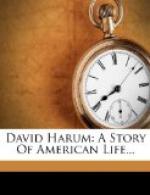“You’re real kind, I’m sure,” responded Mrs. Cullom, replying to the other’s welcome and remarks seriatim; “I guess, though, I don’t look much like Cynthy Sweetland, if I do feel twenty years younger ’n I did a while ago; an’ I have ben cryin’, I allow, but not fer sorro’, Polly Harum,” she exclaimed, giving the other her maiden name. “Your brother Dave comes putty nigh to bein’ an angel!”
“Wa’al,” replied Mrs. Bixbee with a twinkle, “I reckon Dave might hev to be fixed up some afore he come out in that pertic’ler shape, but,” she added impressively, “es fur as bein’ a man goes, he’s ’bout ’s good ’s they make ’em. I know folks thinks he’s a hard bargainer, an’ close-fisted, an’ some on ’em that ain’t fit to lick up his tracks says more’n that. He’s got his own ways, I’ll allow, but down at bottom, an’ all through, I know the’ ain’t no better man livin’. No, ma’am, the’ ain’t, an’ what he’s ben to me, Cynthy Cullom, nobody knows but me—an’—an’—mebbe the Lord—though I hev seen the time,” she said tentatively, “when it seemed to me ’t I knowed more about my affairs ’n He did,” and she looked doubtfully at her companion, who had been following her with affirmative and sympathetic nods, and now drew her chair a little closer, and said softly: “Yes, yes, I know. I ben putty doubtful an’ rebellious myself a good many times, but seems now as if He had had me in His mercy all the time.” Here Aunt Polly’s sense of humor asserted itself. “What’s Dave ben up to now?” she asked.
And then the widow told her story, with tears and smiles, and the keen enjoyment which we all have in talking about ourselves to a sympathetic listener like Aunt Polly, whose interjections pointed and illuminated the narrative. When it was finished she leaned forward and kissed Mrs. Cullom on the cheek.
“I can’t tell ye how glad I be for ye,” she said; “but if I’d known that David held that morgidge, I could hev told ye ye needn’t hev worried yourself a mite. He wouldn’t never have taken your prop’ty, more’n he’d rob a hen-roost. But he done the thing his own way—kind o’ fetched it round fer a Merry Chris’mus, didn’t he? Curious,” she said reflectively, after a momentary pause, “how he lays up things about his childhood,” and then, with a searching look at the Widow Cullom, “you didn’t let on, an’ I didn’t ask ye, but of course you’ve heard the things that some folks says of him, an’ natchally they got some holt on your mind. There’s that story about ‘Lish, over to Whitcom—you heard somethin’ about that, didn’t ye?”
“Yes,” admitted the widow, “I heard somethin’ of it, I s’pose.”
“Wa’al,” said Mrs. Bixbee, “you never heard the hull story, ner anybody else really, but I’m goin’ to tell it to ye—”
“Yes,” said Mrs. Cullom assentingly.
Mrs. Bixbee sat up straight in her chair with her hands on her knees and an air of one who would see justice done.




